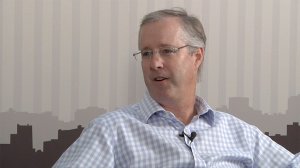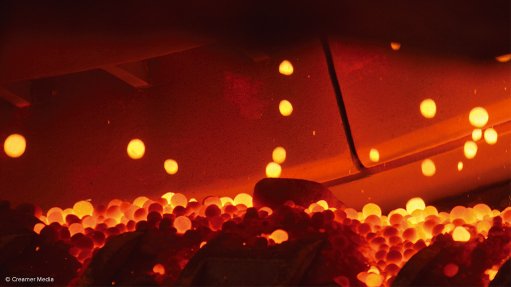Outgoing Barloworld CEO on surviving tough times and the group’s prospects

Outgoing Barloworld CEO Clive Thomson discusses his tenure at the helm of the South African industrial conglomerate. Camerawork:Nicholas Boyd. Editing: Lionel da Silva
JSE-listed Barloworld announced the appointment of new CEO Dominic Sewela, who replaced the outgoing Clive Thomson last month.
Thomson was appointed in December 2006 and managed the South African industrial giant during some of the most challenging economic periods in recent history.
In an exclusive interview with Engineering News, Thomson discussed the challenges and milestones of his tenure as Barloworld CEO, and also gave some advice to Sewela.
Shortly after his appointment, Barloworld underwent significant restructuring to unlock shareholder value and improve shareholder returns.
In 2007, Barloworld unbundled its cement manufacturing business, PPC, and its paint interest, Freeworld Coatings, listing the latter separately on the JSE. The company also disposed of its scientific divisions, comprising the Melles Griot and Laboratory businesses, as well as its Freightliner truck business, in the US, and its Coating Australia business.
The transactions collectively amounted to about R2.3-billion and Barloworld declared a special dividend of more than R1-billion to the delight of shareholders.
“By the end of 2007, I felt pretty comfortable that we had achieved the objectives set out in the beginning of the year, which ended with a share price that reacted well to the restructuring,” Thomson recounts.
He felt positive going into 2008, owing to the progress the company was making in its core businesses focused on the equipment and automotive, materials handling and logistics sectors.
However, in September 2008, the global economic downturn placed most Western economies in a recession.
Thomson recounts that Barloworld had forecast 60% growth for its Russian business revenues for the ensuing year, which was then revised to a flat projection. However, the actual financial results for 2009 showed a 65% decline in deliveries for Barloworld’s Russian business.
“This confirmed that we were in a very cyclical business, particularly with the Caterpillar business, which supplies equipment to large mining and infrastructure projects,” Thomson notes, adding that Caterpillar’s global sales fell by a larger percentage following the 2008 economic crisis than at any time since the Great Depression of the 1930s.
“It was an extreme period, which was a significant challenge,” he recounts. Subsequently, Thomson had to change his focus for the company from maximising profit margins to managing cash flows.
“Companies survive with cash flows, not with profits. Profits are nice for the good times, but, when things get tough, it is all about cash and debt levels.”
He explains that his goal was “to generate as much cash as possible”, which was achieved by maintaining tight control over inventory levels and receivables, while reducing debt levels as much as possible.
“I am pleased to say that, although it was a stressful time where we saw significant drop-offs in our revenues across pretty much all of our businesses during 2009/10, our balance sheet remained strong, our cash flows were good and our debt levels were contained.”
Thomson notes that Barloworld recovered strongly in 2011 and 2012 and, prior to the commodity price slump, the company sold more mining units in Southern Africa and Russia in 2012 than during its previous peak in 2008.
Thomson is “very pleased” with the composition of the group, adding that “the balance sheet is strong and healthy and, therefore, well placed for future organic and acquisitive growth”.
He adds that the group is in good stead with the current executive team and the leadership of Sewela, who is an “experienced executive and a key and core part of the business”.
Sewela served as CEO of Barloworld’s South African Caterpillar business in 2008 and was later appointed CEO of the Equipment business across Southern Africa.
Thomson asserts that Sewela “has a very good feel for the company culture, value systems and competences, and, therefore . . . hits the ground running”.
He advises Sewela to learn from the rich and proud history of Barloworld, which was formed in 1902, but also to adapt and be flexible in his strategy because an organisation has to adapt and evolve to remain relevant and successful.
Thomson suggests that “although a bit of a cliché . . . the only sustainable form of competitive advantage an organisation has is its people”.
He further advises that Sewela will have to balance decisions affecting the short term with those affecting the long term: “Often, as a CEO, you are under short-term pressures from the market to deliver quarterly or half-yearly results, and those are important, but you also need to balance that with making the right decisions for the long term”.
Thomson encourages Sewela to be bold in his vision, strategic objectives and decision-making to position the group for success in the next ten years and beyond.
Article Enquiry
Email Article
Save Article
Feedback
To advertise email advertising@creamermedia.co.za or click here
Press Office
Announcements
What's On
Subscribe to improve your user experience...
Option 1 (equivalent of R125 a month):
Receive a weekly copy of Creamer Media's Engineering News & Mining Weekly magazine
(print copy for those in South Africa and e-magazine for those outside of South Africa)
Receive daily email newsletters
Access to full search results
Access archive of magazine back copies
Access to Projects in Progress
Access to ONE Research Report of your choice in PDF format
Option 2 (equivalent of R375 a month):
All benefits from Option 1
PLUS
Access to Creamer Media's Research Channel Africa for ALL Research Reports, in PDF format, on various industrial and mining sectors
including Electricity; Water; Energy Transition; Hydrogen; Roads, Rail and Ports; Coal; Gold; Platinum; Battery Metals; etc.
Already a subscriber?
Forgotten your password?
Receive weekly copy of Creamer Media's Engineering News & Mining Weekly magazine (print copy for those in South Africa and e-magazine for those outside of South Africa)
➕
Recieve daily email newsletters
➕
Access to full search results
➕
Access archive of magazine back copies
➕
Access to Projects in Progress
➕
Access to ONE Research Report of your choice in PDF format
RESEARCH CHANNEL AFRICA
R4500 (equivalent of R375 a month)
SUBSCRIBEAll benefits from Option 1
➕
Access to Creamer Media's Research Channel Africa for ALL Research Reports on various industrial and mining sectors, in PDF format, including on:
Electricity
➕
Water
➕
Energy Transition
➕
Hydrogen
➕
Roads, Rail and Ports
➕
Coal
➕
Gold
➕
Platinum
➕
Battery Metals
➕
etc.
Receive all benefits from Option 1 or Option 2 delivered to numerous people at your company
➕
Multiple User names and Passwords for simultaneous log-ins
➕
Intranet integration access to all in your organisation

















